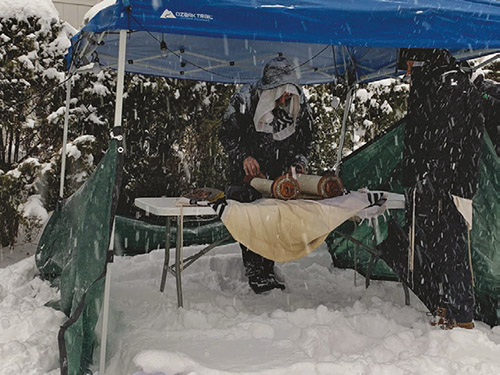



After our shuls were closed down due to the pandemic, and backyard minyanim were allowed, many blocks in frum communities hosted their own backyard minyan; sometimes—in order to minimize close contact—there were multiple minyanim on the same block. As time went on and shuls started to reopen, the number of backyard minyanim started to dwindle. As the weather turned from “I miss the shul’s air conditioner” hot to “I miss the warmth of davening inside” cold, the numbers continued to dwindle. Then came this past week’s nor’easter. For at least one Passaic backyard minyan, though, a foot of snow would not deter them.
For the second time, the canopies of the over a dozen tents in the Soled’s backyard were removed before a winter storm so that the tents wouldn’t collapse. The first time, the tarp covering the 10’ x 30’ carport that served as the women’s section during the Yomim Tovim, and as the “mask-only” section afterwards, was not removed, with the thinking being that since it was designed to protect a vehicle from the weather—and had what seemed to be heavier-duty poles than the canopy/tents—it could withstand the 5 inches of snow that had been predicted. This time, the tarp covering the 10’ x 14’ that replaced the first carport (a”h) was removed, along with the canopy of the 10’ x 10’ canopy tent purchased to supplement the mask-only section.
It’s not easy to maintain an outdoor minyan in the winter, but thanks to the dedication of Betzalel Mezei and the help of a number of regulars, the minyan at 109 Lafayette Avenue in Passaic is still going. There’s a WhatsApp chat that updates davening times and makes sure that there are enough commitments, and propane heaters, for every tent. One of those “helpers,” considered the unofficial maintenance person, explained why the minyan is so important: “It has enabled me to attend minyan again and share the burden of worry with others who either feel or respect how I feel during this pandemic.” There might be something even more personal about it, as his son had his bar mitzvah at the minyan. “My son was able to not only lein, but was able to have a socially distanced kiddush as well.” Despite all the time and effort he puts in to make sure others are as comfortable as possible under the conditions, he says that “everyone has taken Areivim Zeh b’Zeh to a new level.” So far, three boys have put on tefillin for the first time at the minyan, and two bar mitzvah boys leined there, with a third iy”H doing so in the coming weeks.
Besides the propane heaters (and wearing multiple layers of clothing), privacy screens help keep heat within the area of each tent while minimizing wind gusts, despite allowing air flow not only above the screens, but through them (so that they don’t act like a sail). Wind can be very dangerous for tents—two were damaged in previous storms—but parts from a tent destroyed at a no-longer-operating local minyan were harvested to put the tents back together.
We are all hoping and praying that this pandemic comes to an end very soon. Some of those prayers are still being offered at outdoor minyanim, despite the inclement weather.
Rabbi Dov Kramer, who usually davens at this minyan, was not zocheh to be there during the nor’easter, as he had to stay in the city in order to be at work. To contact him about help with your outdoor minyan, you can email him at RabbiDMK@gmail.com.










